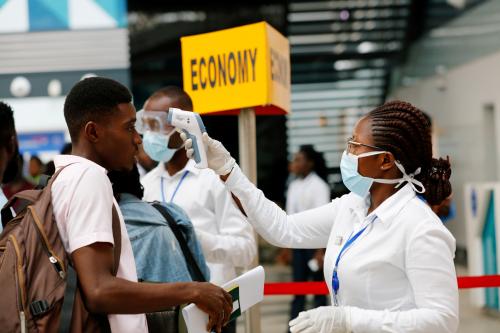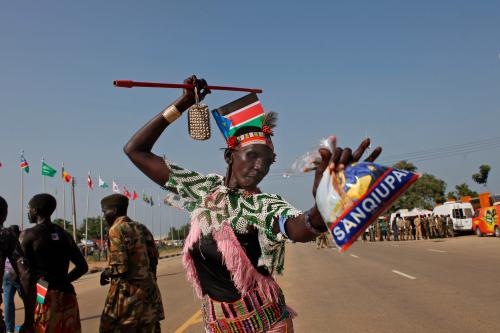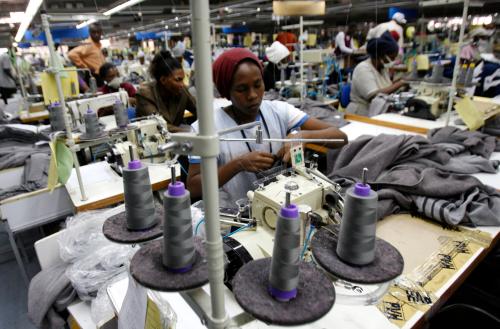Ebola spreads to urban center in the DRC; WHO deploys new vaccine
The Democratic Republic of the Congo’s (DRC) health minister announced on Wednesday, May 16 that the current Ebola outbreak had spread to urban areas with the first confirmed case in Mbandaka, a city of 1 million people. Health officials announced 13 more confirmed cases on Friday, including two new cases in Mbandaka, as the death toll from the ongoing outbreak reached 25. Also on Friday, the World Health Organization (WHO) updated its public health risk assessment and raised it from “high” to “very high” for the DRC and from “moderate” to “high” for neighboring countries. However, it did not raise its global risk assessment, which is currently classified as “low.” The ongoing Ebola outbreak originated in a remote area in the DRC’s Equateur province, more than a 100 miles south of Mbandaka and is the ninth outbreak in the country since the 1970s. Commenting on the outbreaks spread to urban areas, Peter Salama, a senior WHO official, noted that urban Ebola “is a very different animal from rural Ebola. The potential for an explosive increase in cases is now there.” The threat of the virus spreading to other areas has increased, as Mbandaka is located on the Congo River, which is a major route for trade and transport, and the Republic of the Congo is on the other side of the river.
The international community and health officials in the DRC have mobilized quickly to contain the outbreak. Doctors Without Borders has opened treatment centers in Bikoro, the epicenter of the current outbreak. The Congolese health ministry has deployed epidemiologists in the affected areas to track down people who may have had contact with infected individuals. Dr. Tedros Adhanom Ghebreyesus, the WHO director-general, visited the country last weekend “to take stock of the situation” and met with President Joseph Kabila to discuss the issue. According to The Washington Post, the Centers for Disease Control and Prevention in Atlanta, which responded to the Ebola outbreak in West Africa in 2014, is ready to deploy teams to the DRC as soon as the WHO has assessed its needs for the response. On Thursday, the World Bank announced it is providing $3 million to support the DRC’s Ebola Virus Disease Response Plan.
As part of its response, the WHO organization is deploying an experimental Ebola vaccine, 4,300 doses of which have arrived in Kinshasa with 7,540 more on the way. This is the vaccine’s first deployment, which is still unlicensed but has been cleared for “compassionate use” by the WHO. During field trials in Guinea in 2016, it was found to be 100 percent effective. The vaccine is designed for ring vaccination where all people who might have recent contact with an infected individual are tracked down and vaccinated to prevent the disease from spreading. The lack of reliable electricity in remote areas is a major challenge in deploying the vaccine because it must be stored at temperatures between -60 and -80 degrees Celsius. Another challenge is that under the “compassionate use” protocol, health workers must get fully informed signed consent from each individual who is vaccinated, which is expected to require at least 45 minutes per individual and require translators for several local languages.
The United Nations deploys more peacekeepers to South Sudan as peace talks begin
This week, U.N. Undersecretary-General for Humanitarian Affairs and Emergency Relief Coordinator Mark Lowcock concluded his two-day visit to South Sudan—where civil war and the resulting humanitarian crisis have entered their fifth year. On Wednesday, May 16, Lowcock issued a dismal report on the country’s ongoing hostilities, stating, “Belligerents use scorched-earth tactics, murder, and rape as weapons of war… Seven million people need humanitarian assistance in 2018. And things are simply getting worse.” Since the beginning of the conflict in December 2013, fighting between government troops led by President Salva Kiir and rebel forces led by former Vice President Riek Machar has forcibly displaced over 4 million people, with more than 2 million people fleeing to neighboring countries. Meanwhile, internally displaced persons in South Sudan rely heavily on humanitarian assistance to survive; however, violence against aid workers by both the government and opposition forces have restricted humanitarian access and obstructed the delivery of life-saving aid. Lowcock highlighted these challenges, noting, “The aid agencies are subjected to harassment, extortions, and looting, kidnapping, killings, and other blockage all over the country and those things have a direct effect reducing our ability to help people who need humanitarian assistance.”
On Thursday, David Shearer, the head of the U.N. mission in South Sudan (UNMISS), announced that it would send 150 more peacekeepers to Unity State to protect civilians who are being targeted in intensifying clashes between the warring parties. “Our fresh deployment will enable peacekeeping troops to patrol deeper to reach remote villages where the worst atrocities are taking place to create a protective presence and deter further fighting,” he said. On the same day, the South Sudanese warring parties reinitiated peace talks in Ethiopia, as a part of a High-Level Revitalization Forum organized by the Intergovernmental Authority on Development (IGAD), an East African bloc. In advance of these talks, IGAD hosted discussions “to revisit general principles and practices relating to governance and security issues during political transitions.” These sessions aimed to prepare negotiators to settle on security and power-sharing arrangements for a Transitional Government of National Unity at the forum.
While the IGAD-led initiative strives to achieve a negotiated political settlement in South Sudan, last week the White House announced that the U.S. would be reviewing its own strategy in South Sudan to ensure that U.S. assistance is not falling into the wrong hands and prolonging the conflict. John Prendergast, the founding director of the Enough Project, argued earlier this week that the U.S. should not cut its humanitarian assistance to South Sudan, which would devastate the victims of the conflict; however, the U.S. could use targeted financial sanctions against the South Sudanese leaders responsible for the continued violence to increase the pressure on the warring parties to end the conflict.
Kenya passes controversial cybercrime law and Zimbabwe bans cryptocurrencies
On Wednesday, May 16, Kenyan President Uhuru Kenyatta signed the Computer Misuse and Cybercrimes Act 2018 (formerly Computer and Cybercrimes Bill 2017), a broad law intended to prevent computer fraud, cyber bullying, identity theft and impersonation, phishing, interception of electronic messages or money transfers, cyberterrorism, credit card fraud, and wrongful distribution of obscene or intimate images, among other activities. The bill includes tools for investigating and punishing hackers—including authorization for searching and seizing stored data and permission to intercept data in real time as well as provisions for penalties such as KSh5 million ($50,000) fine or a three-year jail term for hackers. It also establishes a National Computer and Cybercrimes Coordination Committee, which will advise the administration “on matters relating to block chain technology, critical infrastructure, mobile money and trust accounts.”
Notably, Kenya is among the top-10 most targeted countries in the world when it comes to attacks by mobile malware. In fact, according to CIO East Africa, cybercrime cost Kenya over KSh21.2 billion in 2017. However, this bill has come under immense criticism due to its potential to constrain free speech. In an attempt to eliminate “fake news,” the bill states, “A person who intentionally publishes false, misleading or fictitious data or misinforms with intent that the data shall be considered or acted upon as authentic, with or without any financial gain, commits an offence and shall, on conviction, be liable to a fine not exceeding five million shillings or to imprisonment for a term not exceeding two years, or to both.” The Committee to Protect Journalists, along with reporters, media companies, bloggers, free speech advocates, and social media users, have been lobbying the Kenyan government to reject the bill, arguing that it might be used to curtail the rights of the media as well as criminalizes unauthorized access to government data, a provision that also removes protection for whistleblowers. Tope Ogundipe, director of programs at Digital Rights NGO Paradigm Initiative, has emphasized that this legal move is spreading in Africa: “A worrisome trend in the development and adoption of such legislation (in Africa) has been the potential, maybe even the intent in other cases, to violate human rights, especially related to freedom of expression, right to privacy and access to information.”
Also this week, Zimbabwe’s central bank governor, John Mangudya, prohibited local banks from engaging with payments linked to cryptocurrencies, blaming a lack of regulation in the country and stating, “The nature of cryptocurrency transactions make them the currency of choice for money launderers and other criminals.” Notably, Zimbabwe has been one of the most active African countries when it comes to the use of cryptocurrencies. According to Quartz Africa, bitcoin has been crucial for businesses in Zimbabwe, and due to the lack of liquidity of its market, the value skyrocketed over the past year. In fact, on Monday, bitcoin was trading at $12,400 on the country’s largest virtual currency trading platform, Golix.com. Importantly, local cryptocurrency trading exchanges have not been outlawed, and VOA Zimbabwe reports that the new policy will likely not affect sales between individuals, but will impact those conducted through exchanges.
Burundi passes referendum to eliminate presidential term limits
On Thursday, May 17, Burundi held a referendum to eliminate its constitutionally mandated term limits for president. Despite intense resistance from the political opposition, civil society groups, and the Catholic Church, it passed with, according to preliminary numbers, 80 percent of the vote. The results mean that current President Pierre Nkurunziza could serve at least two more seven-year terms. Nkurunziza, who has been in power for 13 years, could potentially serve until 2034. His current term, which began in 2015, was met with protests and violence—leading to at least 1,700 deaths and the displacement of 425,000 people since then—as many considered it his third term (and a violation of the country’s constitutional term limits at the time), while he argued that a technicality only made it his second.
The Brookings Institution is committed to quality, independence, and impact.
We are supported by a diverse array of funders. In line with our values and policies, each Brookings publication represents the sole views of its author(s).








Commentary
Africa in the news: DRC’s Ebola response, South Sudan’s peace talks, and Kenya’s cybercrime law
May 18, 2018